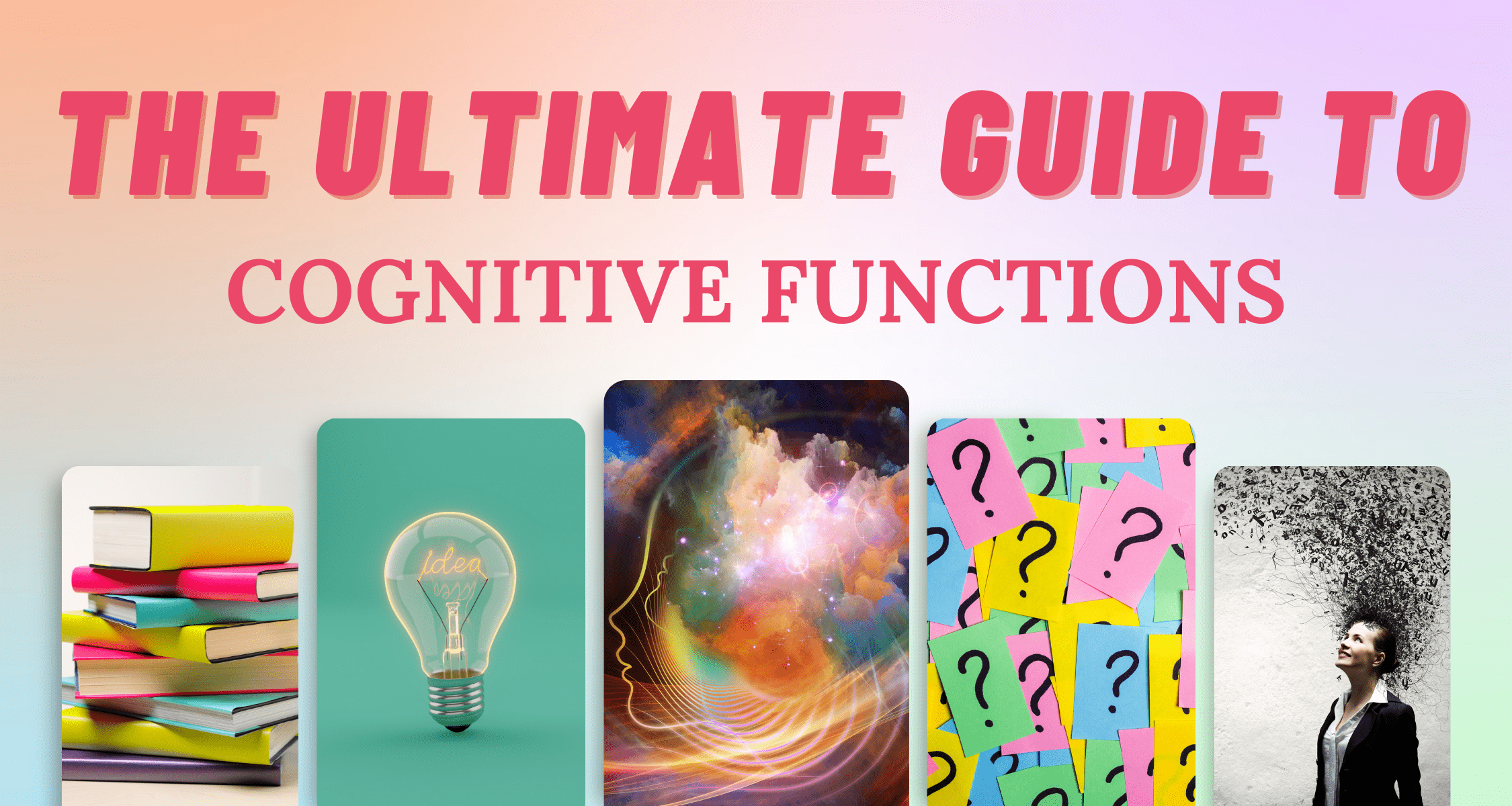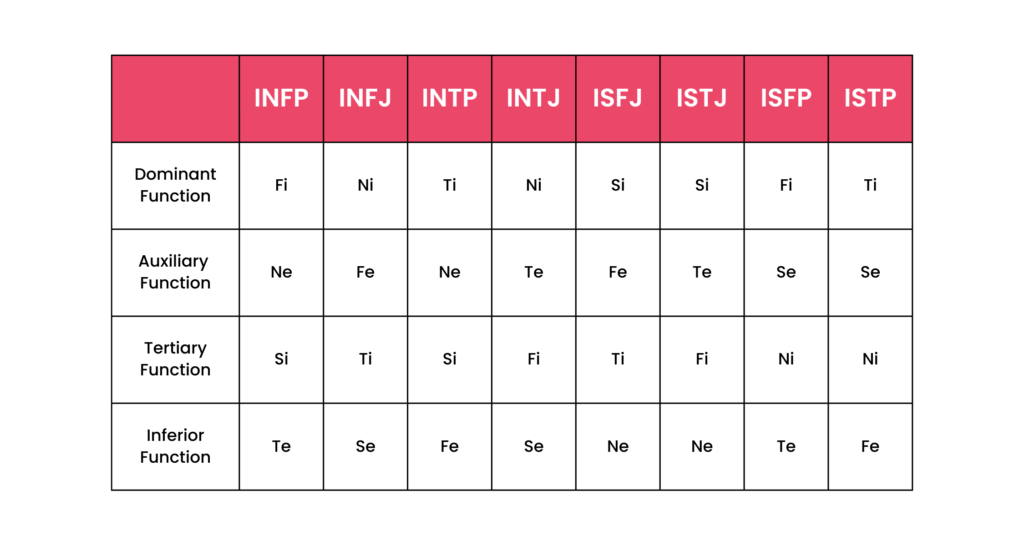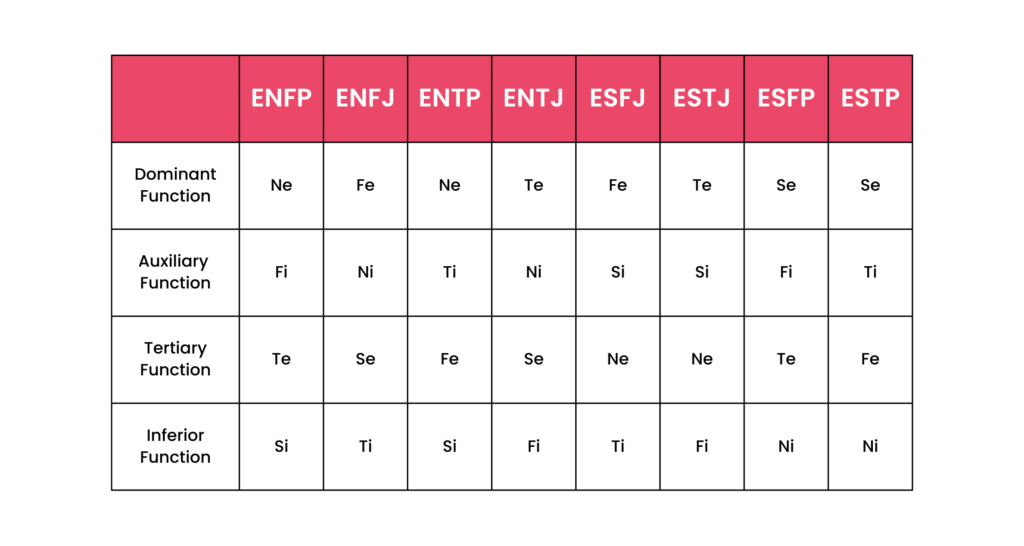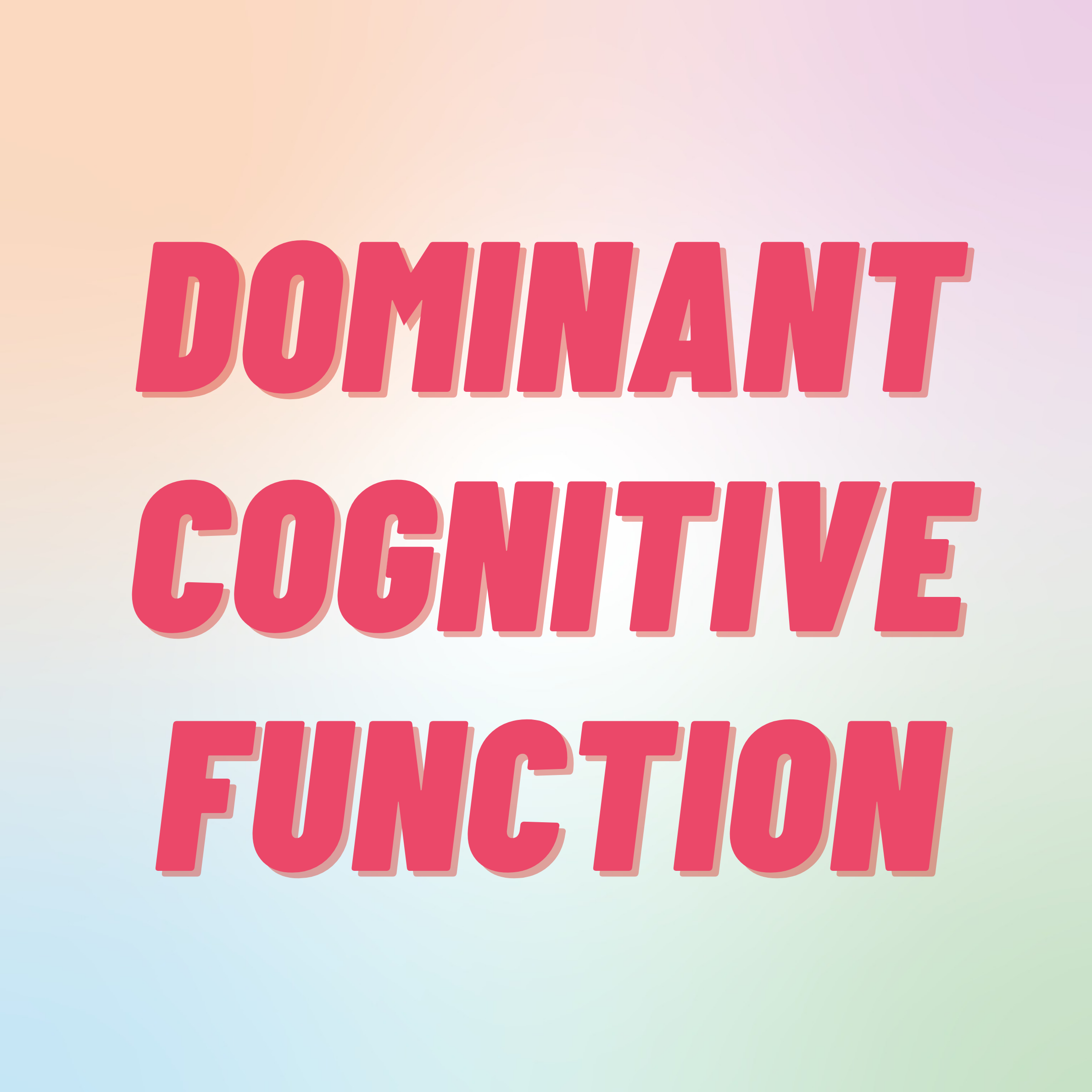The Ultimate Guide to Cognitive Functions
If you’re into personality type theories, you’ve probably heard of cognitive functions. But what are they, exactly? And what do they mean in relation to your own personality type? In this post, we’ll take a closer look at the meaning of cognitive functions and explore how they can help you better understand yourself and others.

If you’re into personality type theories, you’ve probably heard of cognitive functions. But what are they, exactly? And what do they mean in relation to your own personality type? In this post, we’ll take a closer look at the meaning of cognitive functions and explore how they can help you better understand yourself and others.
So buckle up, it’s time to get nerdy about typology!
What are cognitive functions?
Cognitive functions are modes of processing information and making decisions based on your personality type. They form the basis of how we think and draw conclusions.
Why should you learn about cognitive functions?
Most people know about the 16 personalities framework, but fewer are familiar with the cognitive functions that underlie them. Nevertheless, understanding cognitive functions can be very helpful in a number of ways.
For one thing, learning about cognitive functions can be an incredible source of personal growth, and it can help you to understand your own strengths and weaknesses.
In turn, this can assist you in making better-informed decisions, both in your personal life and in your career. Self-awareness is essential for living a fulfilling existence, and learning about cognitive functions can support you along this path.
Learning about cognitive functions can also help you to understand and relate to people of different personality types. We all think and process information in different ways, and it can encourage you to appreciate the way others operate.
Not only that, but it can also help you to improve your communication skills because you will have a better handle on how others approach life.
In short, there are many good reasons to learn about cognitive functions. So if you’re not already familiar with them, it’s definitely worth taking some time to learn more.
Perceiving vs. judging cognitive functions
There are two main types of cognitive functions: perceiving and judging. Here’s a summary of each one:
1) Perceiving cognitive functions: Perceiving functions involve taking in information from the world around us either using our five senses (sensing) or through underlying meanings and patterns (intuition). This can be hearing a noise or seeing the connection between two seemingly unrelated events. For example, if you open the window and see that it’s sunny outside, you are using your vision to perceive that information.
2) Judging cognitive functions: Judging functions involve making decisions using the information that we have perceived based on logic (thinking) or values and emotions (feeling). This can include things like choosing a course of action, forming an opinion, or solving a problem. For example, deciding whether to go outside in the sun or stay inside to do some work.
Both types of cognitive functions are essential to our everyday lives. However, perceiving cognitive functions tend to be more automatic and unconscious, while judging cognitive functions require more effort and conscious thought.
These functions can be extraverted, which means they are directed at the outer world, or introverted, which means they are internalized.
This means there are eight cognitive functions in total. The first four on the list are perceiving cognitive functions, and the last four are judging cognitive functions:
- Extraverted Sensing (Se)
- Introverted Sensing (Si)
- Extraverted Intuition (Ne)
- Introverted Intuition (Ni)
- Extraverted Feeling (Fe)
- Introverted Feeling (Fi)
- Extraverted Thinking (Te)
- Introverted Thinking (Ti)
Each personality type primarily uses four cognitive functions and the position of each cognitive function impacts how each person uses it. You can see which functions each personality type uses in the table below.


Summarizing the eight cognitive functions
Before we delve into how you use each function, let’s have a quick look at how they work. We’ll look at each function in greater detail later in the post.
- Extraverted Sensing (Se): Extraverted Sensing is associated with experiencing the physical world. If this is your dominant function, you will likely be a practical person who is able to live in the moment and notice details about your surroundings.
- Introverted Sensing (Si): Introverted Sensing is associated with recalling data and information from the past. If this is your dominant function, you will likely have a very good memory and value routine and tradition.
- Extraverted Intuition (Ne): Extraverted Intuition is associated with noticing connections between things and seeing possibilities. If this is your dominant function, you will likely be a creative person who loves exploring new ideas.
- Introverted Intuition (Ni): Introverted Intuition is associated with insights based on your intuition. If this is your dominant function, you will likely have strong instincts and be able to accurately guess how things might play out in the future.
- Extraverted Feeling (Fe): Extraverted Feeling is associated with considering other people’s preferences and emotions. If this is your dominant function, you will likely be a people-oriented person who likes to make sure that everyone is happy.
- Introverted Feeling (Fi): Introverted Feeling is associated with your own personal values and morals. If this is your dominant function, you will likely have a strong desire to live a life in alignment with what’s important to you.
- Extraverted Thinking (Te): Extraverted Thinking is associated with assessing objective data. If this is your dominant function, you will likely be very focused on facts, timelines, and data.
- Introverted Thinking (Ti): Introverted Thinking is associated with your own internal framework of how the world works. If this is your dominant function, you will likely be concerned about the accuracy of information and enjoy understanding how things work.
Understanding your cognitive function stack
Now let’s consider your cognitive functions stack, which is how you use each function. Each person largely uses four of the eight cognitive functions, but we tend to favor one or two. Each function is ranked in terms of strength and essentially how developed it is.
Your first cognitive function is known as the dominant function, your second is the auxiliary function, your third is the tertiary function, and your fourth is the inferior function. Your last four are largely used unconsciously, and they tend not to play a significant role in people’s lives.

Dominant Function
Your dominant function is the one that you use most often and naturally. It’s where your strengths lie. You can think of your dominant function as the leader and it’s the core of your interactions with the world.

Auxiliary Function
Your auxiliary function is the one that supports your dominant function and balances it out. It supports your dominant function. You can think of your secondary function as a close advisor to your dominant function.

Tertiary Function
Your tertiary function is weaker and used less consciously. It often doesn’t develop until mid-life. You can think about it as a friend who pops into your life every now and again, sometimes causing trouble and sometimes helping.

Inferior Functions
Your inferior function is weaker again and used even less consciously than your tertiary function. It’s often both a source of aspiration for us and an Achilles Heel. You can think of it as a troublesome acquaintance who you somewhat admire because their strengths are your weaknesses.
Diving into each of the cognitive functions
Let’s take a look at each of the cognitive functions in more detail.
Extraverted Sensing (Se)
Extraverted Sensing is one of the processes that help us understand the world around us. It’s about experiencing and perceiving the external world in the moment and involves taking in information using our five senses.
Extraverted Sensing is all about tangible information. It’s associated with action, movement, and the “here and now”. Those who use it as their dominant cognitive function tend to be very aware of their surroundings. They usually have the ability to notice even very subtle changes in their environment.
Extraverted Sensors are often described as spontaneous and fun-loving because they enjoy experiencing new things and tend to be drawn to sensory pleasures. They are usually very physical people, and they often enjoy adrenaline-filled activities such as skydiving or motorbiking.
Real-world examples of Extraverted Sensing:
- You watch a sunset and observe the incredible colors as well as the sound of the waves.
- You eat lunch and notice the full flavors and texture of the food.
- You hug someone and are aware of how warm they feel.
Extraverted Sensing as a question: what am I physically experiencing right now?
Introverted Sensing (Si)
Introverted Sensing is one of the processes that help us understand our inner world. It’s about experiencing and perceiving our inner world through stored memories of sensory information.
Introverted Sensing is all about soaking up sensory information and storing it for future reference. It’s associated with recalling facts and details from the past. Those who use it as their dominant cognitive function tend to be very good at recalling memories in great detail.
Introverted Sensors are often drawn to structure and routine because they take comfort in things that they know. They tend to be traditional and sentimental people who play by the rules.
Real-world examples of Introverted Sensing:
- You see a flower, and it reminds you of those you used to pick as a child.
- You bite an apple, and you notice it tastes different from those you’ve eaten before.
- You can tell someone is nervous because you notice that their body language is different than usual.
Introverted Sensing as a question: how does this compare to what I remember?
Extraverted Intuition (Ne)
Extraverted Intuition is one of the processes that help us understand the world around us. It’s about experiencing and perceiving the external world through a lens of possibilities.
Extraverted Intuition is all about what could happen and seeing connections between topics. It’s associated with thinking about what could be rather than what is. Those who use it as their dominant cognitive function are often creative and tend to be very good at both brainstorming and problem-solving.
Extraverted Intuitives are good at seeing the big picture, and they tend to have wild imaginations. They are often seen as “ideas people,” and they are usually very curious because they are always questioning things.
Real-world examples of Extraverted Intuition:
- You wonder why your colleague is moving house, and you guess it’s either because he wants to move closer to the office or that he’s lonely in the countryside.
- You spend hours brainstorming all of the different types of businesses you could start in the future.
- You see someone cycle past, and you think about all the different modes of transport that could exist in the future.
Extraverted Intuition as a question: what could be?
Introverted Intuition (Ni)
Introverted Intuition is one of the processes that help us understand our inner world. It’s about using internal intuitive analysis to understand how things work.
Introverted Intuition is all about taking pieces of abstract information and making sense of it. It’s associated with relying on intuition and being able to see how scenarios will likely play out in the long run. Those who use it as their dominant cognitive function sometimes “just know” things that are true even though they can’t explain why.
Introverted Intuitives have the ability to see the big picture and are very good at recognizing patterns. They tend to develop internal maps of how things work, and they naturally delve deep into topics.
Real-world examples of Introverted Intuition:
- You can sense that your new boss has ulterior motives even though he has never said anything obvious to make you think that.
- You take a personality test, and you know what the writer of that question was trying to assess.
- You are facing a challenge at work, and the solution comes to you while you are dreaming.
Introverted Intuition as a question: what is your gut instinct?
Extraverted Feeling (Fe)
Extraverted Feeling is one of the processes that help us make decisions based on the outer world. It’s about taking into account the emotions of others and what’s best for the group.
Extraverted Feeling is all about understanding people’s feelings, social dynamics, and hierarchies. It’s associated with picking up on social subtleties, and it has the desire to maintain harmony. Those who use it as their dominant cognitive function tend to be heavily impacted by other people’s emotions and they make decisions primarily based on the impact they will have on others.
Extraverted Feelers have the ability to tune into people around them and instinctively know what others are feeling. They are naturals at connecting with people and know how to act in a socially acceptable way.
Real-world examples of Extraverted Feeling:
- You can tell that your friend is upset about his breakup even though he says he is ok.
- You sing at a concert and adjust your performance depending on the energy of the audience.
- You are choosing a place to eat dinner with your friends and you ask for their input to make sure they are all happy.
Extraverted Feeling as a question: how do others feel about this?
Introverted Feeling (Fi)
Introverted Feeling is one of the processes that help us make decisions based on our inner world. It’s about taking into account your personal values and beliefs.
Introverted Feeling is all about living authentically and embracing your individuality. It’s associated with self-expression and having a strong sense of what’s right or wrong. Those who use it as their dominant cognitive function tend to be very self-aware and they assess if the outcome of a decision would be in alignment with their own values.
Introverted Feelers feel things very deeply, and they tend to have strong boundaries. They are sensitive individuals who often come across as easy-going until a closely-held value is crossed.
Real-world examples of Introverted Feeling:
- You turn vegetarian because you believe that the way animals are bred for food is cruel.
- You take a new job because the company’s product is eco-friendly and you feel strongly about climate change.
- You campaign outside a government building because you believe that they should be making a different decision surrounding a human rights issue.
Introverted Feeling as a question: how do I feel about this?
Extraverted Thinking (Te)
Extraverted Thinking is one of the processes that help us make decisions based on the outer world. It’s about taking into account objective criteria and external metrics.
Extraverted Thinking is all about understanding and organizing the external world. It’s associated with structure, sequences, and categorizing information. Those who use it as their dominant cognitive function tend to be adept at coming up with frameworks and plans to achieve a goal.
Extraverted Thinkers are naturally task-oriented individuals who value productivity and efficiency. They tend to be very fair people who have a strong sense of justice.
Real-world examples of Extraverted Thinking:
- You draw up a timeline of exactly what has to be done in order to meet a deadline, and you allocate the necessary roles.
- You make a list of all of the criteria for a new car so you can be sure to buy one that is suitable.
- You choose your new sports teammate purely based on the number of goals they have scored per match this season.
Extraverted Thinking as a question: does this make sense objectively?
Introverted Thinking (Ti)
Introverted Thinking is one of the processes that help us make decisions based on our inner world. It’s about taking into account your inner framework of logic and web of knowledge.
Introverted Thinking is all about having an understanding of how the world works. It’s associated with ensuring that data and information are accurate. Those who use it as their dominant cognitive function tend to be talented at problem-solving, and they like to know the reasoning behind things.
Introverted Thinkers like systems to work well and if they find something that’s broken, they often have a strong desire to fix it. They often take time to process their thoughts before sharing them with other people because they want to ensure that what they say is accurate.
Real-world examples of Introverted Thinking:
- You come up with a new framework to help you understand all the different factors that can impact sales growth.
- You are given a classic watch from decades ago, and you spend time understanding how it works.
- You conduct an experiment to see if a theory you have plays out in real life.
Introverted Thinking as a question: does this make sense to me?
Share this post with friends to help them understand cognitive functions
So what have we learned today? We’ve explored the eight cognitive functions and how each of us primarily uses four of them. Knowing about cognitive functions can help you understand how you experience the world and why you make the decisions you do.
If you haven’t already, be sure to check out our other post on personality type compatibility. Or perhaps you have a friend who wants to take their personality-type journey one step further and learn about cognitive functions? Share this post with them and see what they think!
Ready to meet your personality match?
If you’re looking for your personality match, you should join So Syncd, a dating app that matches compatible personality types. Download So Syncd for free on Android or iOS today to start making deeper connections.




